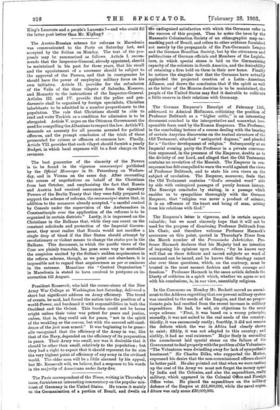In the Commons on Monday Mr. Beckett moved an amend-
ment to the Address regretting that our present military system was unsuited to the needs of the Empire, and that no propor- tionate gain had resulted from the recent increase in military expenditure. He had, he said, six objections to the army corps scheme. "First, it was based on a wrong principle ; secondly, it was not suited to the real needs of the country ; thirdly, it was enormously costly; fourthly, it did not remove the defects which the war in Africa had clearly shown to exist ; fifthly, it was not adapted to this country ; and sixthly, it had no real existence." Major Seely in seconding the amendment laid special stress on the failure of the Government to deal properly with the problem of the Volunteers. "The Volunteers were dwindling away for lack of sympathetic treatment." Sir Charles Dilke, who supported the Motion, expressed his desire that the non-commissioned officers should be better paid. He also pointed out that when we were casting up the cost of the Army we must not forget the money spent by India and the Colonies, and also the expenditure, really military, which appeared in the Colonial Office and Foreign Office votes. He placed the expenditure on the military defence of the Empire at £51,000,000, while the naval expen. diture was only some £30,000,000.










































 Previous page
Previous page